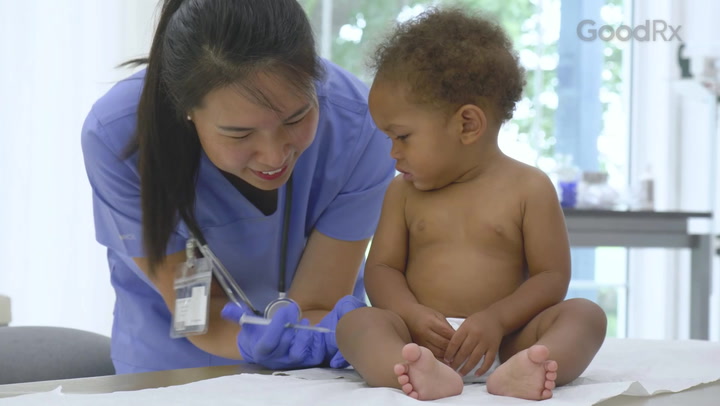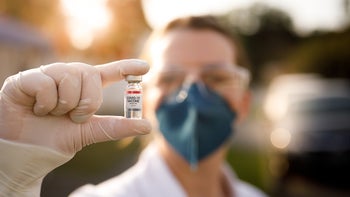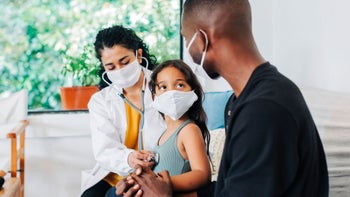
Is the COVID Vaccine Safe During Pregnancy?
Key takeaways:
The COVID-19 vaccine is safe and effective to receive during pregnancy. It lowers the risk of developing severe COVID. It also helps protect you and your baby from complications such as preeclampsia, early delivery, and stillbirth.
Between Pfizer, Moderna, and Novavax, it doesn’t matter which COVID vaccine you receive. If you’ve already received the updated 2024-2025 vaccine, you don’t need any additional doses during pregnancy. However, if you’ve never received a COVID vaccine before, you’ll need an additional dose if you choose the Novavax vaccine.
You may experience some mild and temporary vaccine side effects shortly after your shot, including muscle soreness, fatigue, and headache. These are normal. If you develop a fever, though, let your prenatal care team know. Fever from any cause can be harmful to your baby.
Access savings on related medications
Table of contents

For many, finding out you’re pregnant is one of the happiest moments of your life. You’re about to welcome a new member to your family and you’d do anything to keep them safe. You diligently take your prenatal vitamins, avoid alcohol, and are conscious of how much caffeine you’re drinking. You may even give up your favorite sushi roll for the next 9 months. So why should vaccines be any different?
As we’ve learned more about COVID-19, we know that the vaccine is yet another important strategy in keeping you and your baby safe. The recommendations for COVID vaccination in pregnancy have changed over time, though. So it’s understandable if you may have some confusion about what’s best for you and your baby.
Let’s discuss the most common COVID vaccination concerns of expecting mothers so you can arm yourself with the most up-to-date information in keeping you and your baby safe.
Search and compare options
Is it safe to get the COVID vaccine while pregnant?
Yes, the COVID vaccine is safe to receive during pregnancy.
Researchers have examined thousands of cases involving pregnant women who’ve received a COVID vaccine. Compared to those who didn’t receive a COVID vaccine, there weren’t any known concerns for birth defects, early delivery, or miscarriage or stillbirth.
Researchers have also studied if and how COVID vaccines affect babies during their first 4 weeks of life. A study of thousands of women who received the COVID vaccine during pregnancy didn’t find any safety concerns.
In fact, the vaccine may actually be protective during your baby’s first few weeks of life. The vaccine may lower the number of complications after delivery, lead to fewer visits to the neonatal intensive care unit, and lower the risk of infant death.
What are the risks of receiving the COVID vaccine while pregnant?
If you’re pregnant, you're likely to experience the same types of vaccine side effects as people who aren’t pregnant. Soreness in your arm, tiredness, and headache are all common. Flu-like symptoms, such as chills, nausea, and fever, can also happen.
It’s important to know that the COVID vaccine can’t cause COVID, either. This is because it doesn’t contain a live virus. Symptoms like these are typically a sign that your body is responding to the vaccine and is building protection against future infection.
Choosing a COVID-19 vaccine: Take a deeper dive into the 2024-2025 COVID vaccines to help you decide which one to get.
Vaccines during pregnancy: Here’s a summary of the key benefits of getting vaccinated while you’re expecting.
Paxlovid prep for pregnancy: Discover what to expect from this virus-fighting medication if you need treatment for an active COVID infection.
Fevers are one exception. Having a fever during pregnancy — regardless of the reason — can be harmful to your baby. Most women can safely take an over-the-counter fever-reducer such as acetaminophen (Tylenol) during pregnancy. You should reach out to your prenatal care team before taking it to make sure it’s a good idea. You should also let them know if any of your symptoms last longer than a couple days or seem to be getting worse.
Which COVID vaccines are safe during pregnancy?
No vaccine is preferred or considered safer than the other. You can choose from any of the available 2024-2025 COVID vaccines, including:
Moderna COVID vaccine (Spikevax)
Pfizer-BioNTech COVID vaccine (Comirnaty)
You can be vaccinated at any point in your pregnancy, but it’s best to do so as soon as possible to maximize protection for you and your baby.
Do you need multiple COVID vaccine doses during pregnancy?
No, if you’ve already received your updated 2024-2025 COVID vaccine, you don’t need another dose.
One exception is if you were previously unvaccinated and you receive the Novavax vaccine. In this case, you’ll need a second Novavax dose 3 to 8 weeks after the first one.
Good to know: If you have a weakened immune system because of a health condition or medication, you may also need a second vaccine dose. It’s typically given 6 months after your first dose to make sure you have continued protection against the virus. This decision is best made with the healthcare professional that’s managing your specific condition.
Is it better to be vaccinated or unvaccinated during pregnancy?
Available data and expert recommendations show that it’s better to be vaccinated during pregnancy.
If you’re pregnant, you’re more likely to get very sick from COVID compared to someone who isn’t pregnant. This means that you may be more likely to need treatment in an intensive care unit (ICU), to be on a ventilator to help you breathe, or to die from an infection. COVID infection can also worsen the risk of having complications during pregnancy, including blood clots, high blood pressure (including preeclampsia), or heavy bleeding after delivery.
Many people think that the COVID vaccine increases the risk of complications during pregnancy. But it’s actually the infection itself that’s dangerous. Severe COVID infections increase the risk of having your baby early or delivering a stillborn baby. It also increases the chance of your baby having to spend time in the neonatal ICU after delivery.
Although the vaccines can cause side effects, the benefits of being vaccinated outweigh the potential risks. COVID vaccines decrease the risk of severe infection and complications from infection. Both the CDC and the American College of Obstetricians and Gynecologists recommend that you receive a COVID vaccine during pregnancy.
Keep in mind: There are a couple exceptions to this recommendation. If you had a serious reaction to a COVID vaccine in the past or developed inflammation around the heart within 3 weeks of receiving a COVID vaccine, discuss the risks and benefits of the vaccine with your prenatal care team before getting another one.
What should you do if you develop COVID while pregnant?
If you develop COVID while pregnant, be sure to contact your prenatal care team right away. They may want to prescribe you medication such as Paxlovid (nirmatrelvir / ritonavir) to help treat it.
You should also follow the standard COVID precautions, including:
Staying at home unless you’re traveling to get medical care
Separating yourself from others in your household to prevent them from getting sick
Wearing a mask in public places, especially crowded ones
Washing your hands frequently
The bottom line
COVID-19 vaccines are safe to receive during pregnancy. Pregnant women are at higher risk for severe COVID infection compared to those who aren’t pregnant. COVID infection can also increase the chance of having complications during pregnancy, including preeclampsia, early delivery, or delivering a stillborn baby.
It’s recommended to get vaccinated for COVID to prevent complications that can affect you and your baby. It doesn’t matter which vaccine you receive, and you can be vaccinated at any point in your pregnancy. You should reach out to your prenatal care team if you test positive for COVID or if you’re experiencing fever and/or prolonged side effects after receiving the vaccine.
Why trust our experts?



References
Berkowitz, H. E., et al. (2023). Strategies to address COVID-19 vaccine and pregnancy myths. MCN. The American Journal of Maternal Child Nursing.
Casubhoy, I., et al. (2024). A scoping review of global COVID-19 vaccine hesitancy among pregnant persons. npj Vaccines.
Centers for Disease Control. (2024). CDC recommends second dose of 2024-2025 COVID-19 vaccine for people 65 years and older and for people who are moderately or severely immunocompromised.
Centers for Disease Control. (2024). COVID-19 vaccination for people who are pregnant or breastfeeding.
Centers for Disease Control. (2024). COVID-19 vaccine basics.
Centers for Disease Control. (2024). Guidelines for vaccinating pregnant persons.
Centers for Disease Control. (2024). How to protect yourself and others.
Centers for Disease Control. (2024). Interim clinical considerations for use of COVID-19 vaccines in the United States.
Cummings, H. W. (2023). COVID-19, pregnancy, childbirth, and breastfeeding: Answers for Ob-Gyns. American College of Obstetricians and Gynecologists.
Fleming-Dutra, K. E., et al. (2023). Safety and effectiveness of maternal COVID-19 vaccines among pregnant people and infants. Obstetrics and Gynecology Clinics of North America.
Jorgenson, S. C. J., et al. (2023). Newborn and early infant outcomes following maternal COVID-19 vaccination during pregnancy. JAMA Pediatrics.
MotherToBaby. (2023). Fever/Hyperthermia.
National Institutes of Health. (2023). Evaluating the safety of COVID-19 treatment during pregnancy.
Norman, M., et al. (2024). Neonatal outcomes after COVID-19 vaccination in pregnancy. JAMA.
Prasad, S., et al. (2022). Systematic review and meta-analysis of the effectiveness and perinatal outcomes of COVID-19 vaccination in pregnancy. Nature Communications.
The American College of Obstetricians and Gynecologists. (n.d.). Why should I get the COVID-19 vaccine while I'm pregnant?
The American College of Obstetricians and Gynecologists. (2024). COVID-19 vaccination considerations for obstetric–gynecologic care.
























